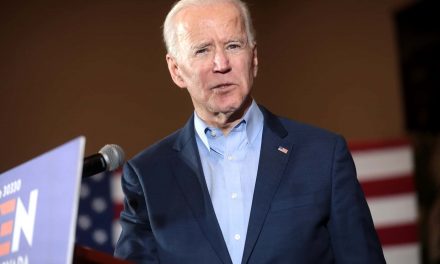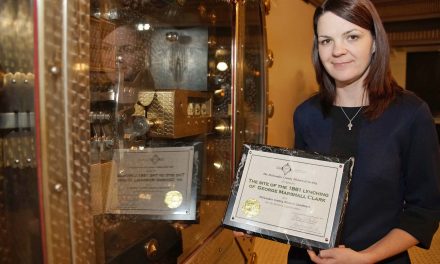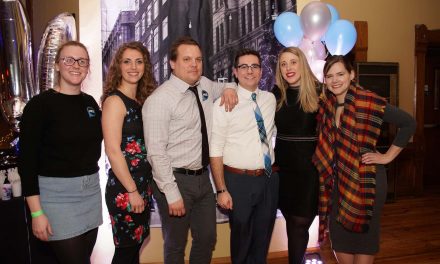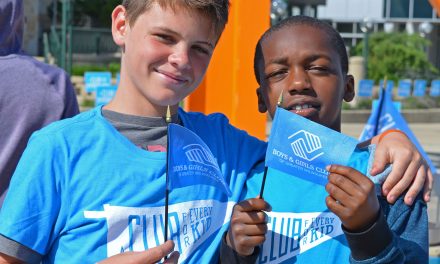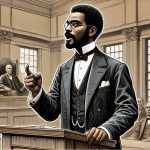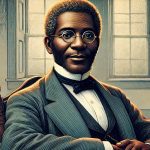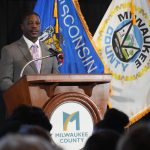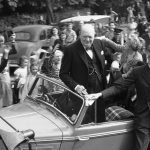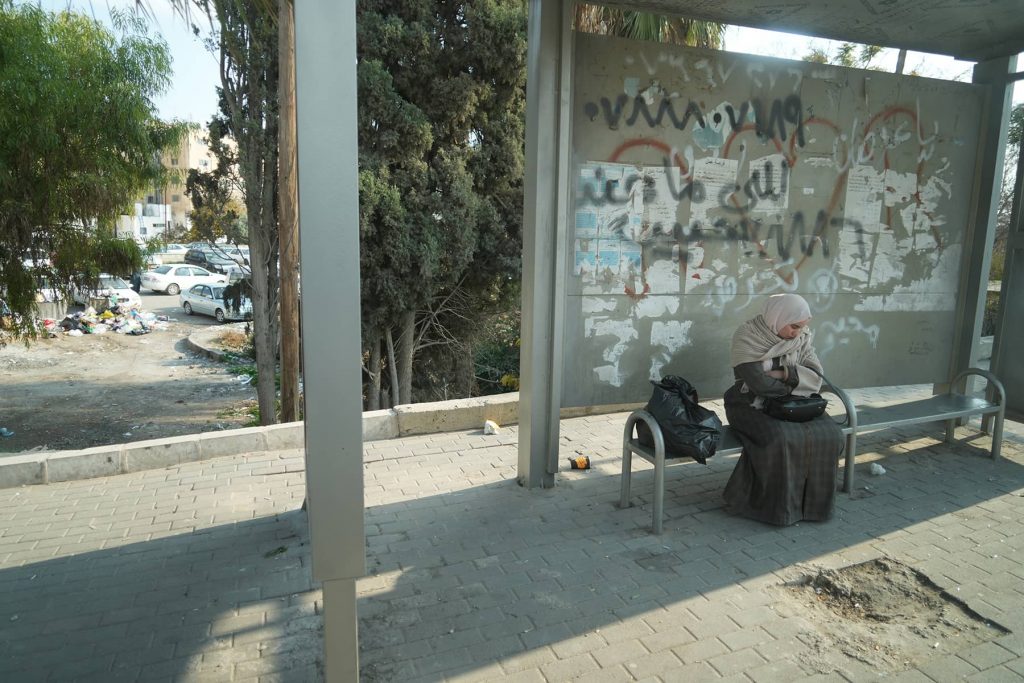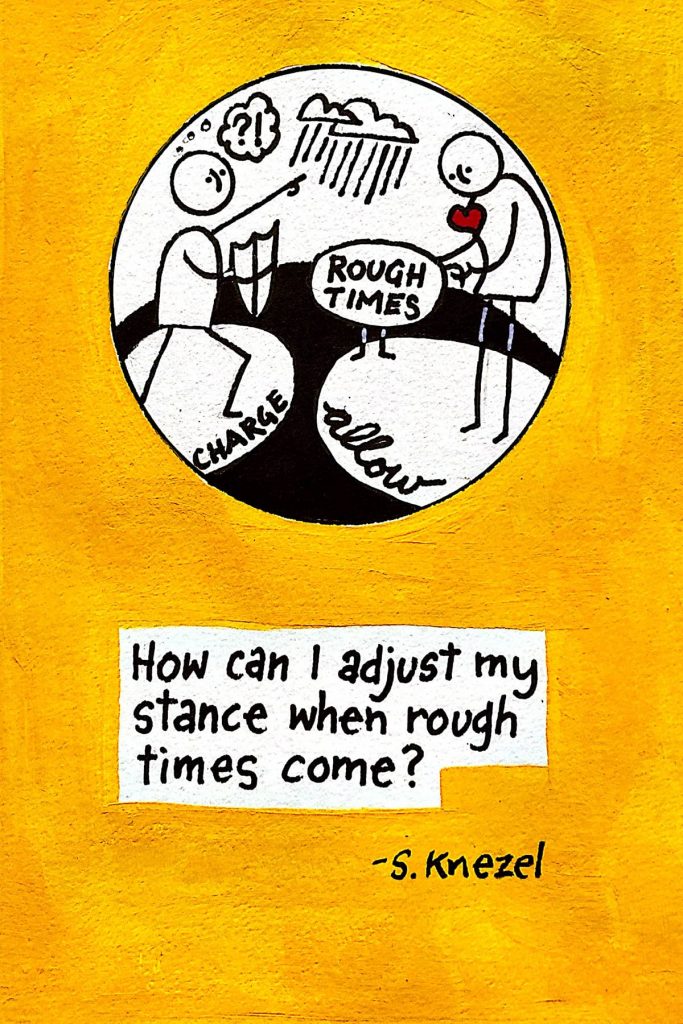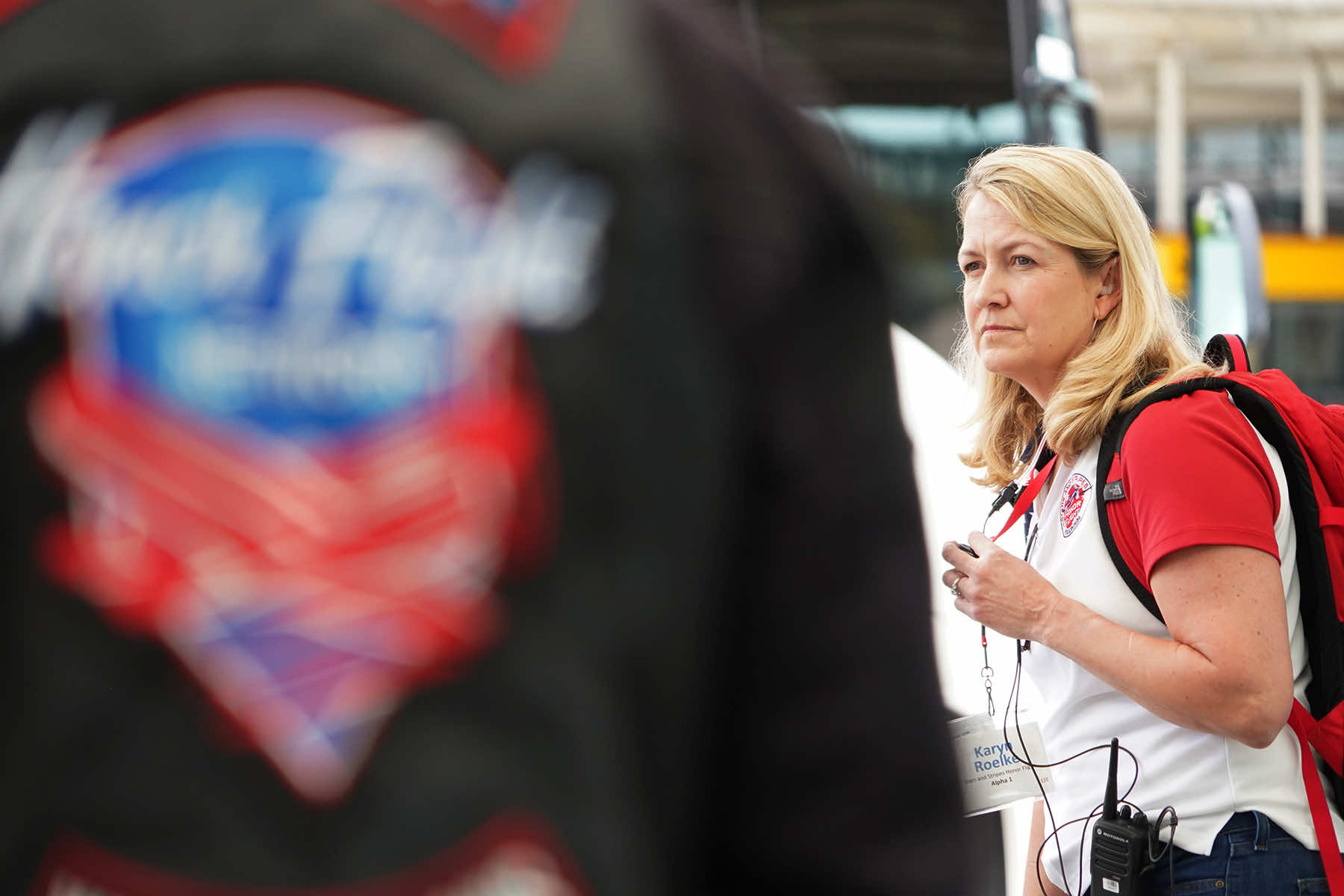
Stars and Stripes Honor Flight is not just a day trip to Washington DC, it is an emotional journey that allows veterans to reconnect with their past, share their stories, and feel the nation’s gratitude in a way they may have never experienced before. It has been especially powerful for veterans of the “Forgotten War.”
Karyn Althoff Roelke has been deeply involved in the organization’s mission since 2014. Her connection to the Stars and Stripes Honor Flight began when her daughter participated in a school project.
“I joined the board when my middle-school-aged daughter was interviewing World War II veterans for a class project,” said Roelke. “She and her classmates reached out to Stars and Stripes Honor Flight to find more vets to interview. During those conversations, they mentioned needing someone in public relations. Since I have a journalism degree, I stepped in and have remained involved ever since.”
Roelke witnessed firsthand the profound emotional impact the trips had on veterans. She said there was nothing more satisfying and fulfilling than seeing a veteran who had not previously felt appreciated, or who had not felt respected in years, receive that public display of gratitude.
“Watching them have a day of not only healing, but also of a camaraderie that they haven’t experienced in many years, it’s really just a beautiful thing,” said Roelke. “And I think people who are attracted to support this mission of healing are also special. Those volunteers who help our oldest vets at the twilight of their lives are just really great people. So I’ve been privileged to meet not only some really exceptional veterans, but just exceptional human beings through the course of our service.”
One of the unique aspects of the Stars and Stripes Honor Flight is its emphasis on family connections. While some Honor Flight hubs, particularly in larger metropolitan areas, do not allow family members to accompany veterans due to space limitations, the Southeastern Wisconsin Hub often includes family guardians.
“For some veterans, the Honor Flight was the first time they’d been able to talk about their experiences in a meaningful way,” said Roelke. “It opened up conversations they’d never had before, with their families and even with themselves.”
Roelke believed that family support was critical to the healing process for veterans. She recalled numerous instances where families expressed gratitude for the opportunity to accompany their loved ones on the flight.
“We felt that a family connection, when it was available, was critical to not only the vet’s well-being but also to how the vet carried on with the rest of their life,” said Roelke. “The shared understanding that comes from these experiences is invaluable. It is a really great thing to hear feedback from sons, daughters, and grandkids who accompanied their fathers or grandfathers on the Honor Flight. They were often told stories they’d never heard before, and gained a greater understanding of why their loved one reacted in certain ways or why they’d never talked about their experiences. That shared understanding was so important for both the veterans and their families.”
While Stars and Stripes Honor Flight serves veterans from various conflicts, there has been a special emphasis on those who served in what is often called the “Forgotten War.” Roelke said that many Korean War veterans did not receive the same level of recognition as their World War II counterparts or even the Vietnam veterans, and that left a lasting impact on them.
“Korean vets said a lot about their homecoming when returning to Milwaukee, because they didn’t get the heroes welcome that a lot of the World War II vets got. But they also didn’t get the scorn that a lot of the Vietnam vets got,” said Roelke. “Most of them told me their return was met with total disinterest. People didn’t understand the conflict. They didn’t know why we were there in Korea, and wondered why anyone would have gone. It was eye-opening to hear this from so many of our Korean War veterans, who felt like their service was overlooked or forgotten by the public.”
Some of the most harrowing stories Roelke heard came from Korean War veterans who fought at the Chosin Reservoir, one of the most brutal battles of the war. The conditions those vets endured included horrific sub-zero temperatures, constant enemy barrages, and hand-to-hand combat.
“One veteran told me how they had to use dead bodies for cover because the terrain was so flat. And the overwhelming odds they faced were just unimaginable. It was amazing how few Americans knew about the Battle of Chosin Reservoir, despite the significant number of Marines involved,” said Roelke. “The stories these veterans shared gave me a better sense of the extreme sacrifices they made and the hardships they endured.”
Roelke said that in April 2019, author Hampton Sides joined a Stars and Stripes Honor Flight. On that particular flight, Sides escorted a Korean War veteran. A journalist and author known for his works on American history, Sides is widely recognized for his narrative style, which blends thorough research with compelling and personal storytelling.
“We were fortunate to have Hampton Sides fly with that time. He wrote some truly amazing military history books that were bestsellers, including ‘On Desperate Ground,’ which is about the Chosin Reservoir,” said Roelke. “He came in from Santa Fe to fly with us because we had an unaccompanied ‘Chosin Marine.’ The two of them spent the day together. So here was a guy who had done in-depth research on the battle, and then a guy who experienced the fight firsthand. It was a really great thing to watch.”
The Book On Desperate Ground: The Marines at The Reservoir, the Korean War’s Greatest Battle was well-received for its vivid portrayal of the battle and its attention to the human aspects of the conflict, making it a significant contribution to Korean War literature.
“Chosin Marine” refers to U.S. Marines who fought in the Battle of Chosin Reservoir during the Korean War, from November 27 to December 13, 1950. Despite facing overwhelming Chinese forces and extreme cold, the Marines showed extraordinary bravery and managed a successful retreat. The term “Chosin Marine” is a self-descriptive title used by U.S. Marines who were veterans of that battle, to differentiate their wartime experience.
Roelke said that Sides joined the Honor flight to also deepen his understanding of their experiences. As a historian, Sides is known for his ability to weave together historical facts with personal narratives, making the past come alive for his readers. But the honor flight gave him something that no amount of research could provide, an intimate connection to the very people who lived through the events he wrote about.
“He had done in-depth research on the Chosin Reservoir, but spending the day with someone who was there, who lived through it, that’s something entirely different,” said Roelke. “It’s one thing to read about these battles, to write about them, but to actually talk to someone who was there, to hear their voice, their memories, that’s something else entirely.”
Roelke recalled the impact another Honor Flight had on a Korean War veteran, who also fought at the Chosin Reservoir. She had always wanted to talk with a “Chosin” veteran about his experience.
“I had asked Donald R. Rust on his flight if he would consider it, and he said he would think about it,” said Roelke. “He told me that he hadn’t really talked about it all, that the memories were pretty painful even after all those years. But he would consider it because he said, ‘I know people need to know.'”
For Rust, the decision to share his story was not an easy one. But after much consideration, he agreed to share his story with Roelke. She visited him at his home in Waukesha a few weeks after the flight. It was a conversation that would leave a lasting impression on both of them.
“He called me about a month after and said, ‘Okay, come on over, I’ll do it.’ So I drove over and we sat at his kitchen table. He told me stories for 35 or 40 minutes. He was a very articulate man and his descriptions were very polished,” said Roelke. “But you could tell that there were times when he really struggled to tell the story. And I was just blown away by the hardships that he endured.”
One of the most harrowing aspects of Rust’s story was the sheer brutality of the battle. He was injured during the Inchon landing as a Marine, and he was in a military hospital for a while. He told Roelke that he had a broken leg and could barely hobble, so was nowhere near recovered. But they needed people back to the frontlines so badly that they sent him anyway.
“I remember asking him what seemed like a silly question at the time, ‘Did you get mail? Were you able to hear from home when you were there, pinned down for a month?’ And he said, ‘Absolutely not. The one thing that I remember getting in the entire month that made it the best day was a single Tootsie Roll.'”
While Rust found some solace in sharing his story, the process of revisiting such painful memories was not easy. Roelke reflected on the emotional toll that it took on him.
“When I think about this it still breaks my heart a little bit. He called me about a month after our talk and said, ‘Thank you for letting me tell my story, but I can’t talk about it anymore. I got it out once, and now my family keeps asking questions, and I don’t want to answer all these questions, so I need to not tell my story anymore.’ It made me realize what it took for him to open up to me,” said Roelke. “He told me that while it did make him feel better to share, revisiting it continuously was making him feel worse.”
Born on April 30, 1929, in Rockford, Illinois, Rust graduated from East Rockford High School in 1946 and enlisted in the United States Marine Corps. Rust served in the Marine Corps from 1946 until 1952, a period that saw him participate in some of the most intense and pivotal moments of the Korean War.
During his military service, Rust was involved in three major campaigns in Korea from 1950 to 1951. One of the most significant of these was the Inchon Amphibious Assault in September 1950, a daring and strategically crucial operation that played a key role in turning the tide of the war. Rust’s bravery during the operation was recognized when he was awarded the Purple Heart for wounds he received.
However, it was the Chosin Reservoir, often referred to as “Frozen Chosin,” that would become the defining experience of Rust’s military career. The battle, fought in the freezing mountains of North Korea in late 1950, is remembered as one of the most grueling and heroic episodes in American military history. Rust entered Eternal Life on November 14, 2021 at age 92.
“On another Honor Flight, we had a veteran who was a photographer in Korea, and he told his son, for the first time, that he had traveled with Marilyn Monroe on a USO tour and photographed her for three days,” said Roelke.
Monroe’s 1954 USO tour of Korea was a glamorous and high-profile visit that brought a touch of Hollywood to the war-torn region in an effort to boost the morale for thousands of troops.
As a photographer, the veteran was a part of the military entourage documenting her interactions with the troops, her performances, and the candid moments in between. For three days, he followed Monroe, capturing images that would become part of the visual history of the Korean War.
Yet, despite the significance of his experience, the veteran never mentioned it to his family. It was not until decades later, standing at the Korean War Memorial during the Honor Flight, that he casually revealed the chapter of his life. His son, shocked by the news, could not believe that such a story had remained untold for so long.
“His son looked at his dad and said, ‘Dad, I am 55 years old. When were you going to tell me this?’ And his dad simply replied, ‘I didn’t think you’d be interested.'”
For many veterans, the Honor Flight has been a cathartic experience that brought long-needed closure.
“I was always struck by how many veterans thought no one wanted to hear their stories. They’d say things like, ‘I don’t want to bore you,’ and then proceed to tell you something incredible, like being a POW or surviving a battle no one else made it through,” said Roelke. “These stories were so important, not just for the veterans but for all of us to hear and understand the sacrifices these men and women made.”
The gratitude expressed by veterans who participated in the Honor Flights can also be overwhelming. Roelke said she has received long thank-you notes from veterans, expressing appreciation for every detail of the trip.
“They commented on every little thing, from granola bars to the handshakes. They paid attention to the simple acts of kindness and that meant so much to them,” said Roelke. “They were also thankful that the experience had created a bridge for them to connect with family, and even the community. To have permission to share their love and express understanding.”
As the veteran population ages, the mission of the Stars and Stripes Honor Flight has become even more urgent. Roelke and her team constantly look ahead, thinking about how they can continue to serve older veterans as their numbers dwindle.
“It is a bittersweet reality,” said Roelke. “But it is one that drives us to keep doing this important work for as long as we can. In many cases, these are their final years. So we want to ensure that our veterans are comfortable and have a memorable experience.”
A Letter to United States of America Korean War Veterans
This letter was given to the Stars and Stripes Honor Flight staff at the Korean War Memorial in Washington DC several years ago. A copy of it has been given to Korean War Veterans on every flight since.
To United States of America Korean War Veterans,
Hello ma’am/sir. Nice to meet you. And honor to meet United States of America Korean War veterans who gave us all when Korea was so poor and weak and needed help. You guys are our nation’s heroes for sure ma’am/sir! My name is Kim, Hyo Young. I’m a South Korean Citizen. I was born in 1981 in South Korea. Currently, I’m living in Seoul which is the Capital City of South Korea. I heard when U.S. troops came to Korea to protect from our enemies during the Korean War, most of the U.S. troops didn’t know where was Korea. Who can risk their life for those you don’t know? U.S. Korean War Veterans did it. In my religious view, only Saints can do that. Because of the U.S. Korean War Veterans’ sacrifice, South Korea could have freedom like now. Our South Koreans didn’t forget and not going to forget U.S. Korean War veterans sacrifice who gave us hope and freedom. Personally, if I have something difficult in my daily life, I think of sacrifices of you guys pretty often. I’m sure you guys had wonderful dreams when you were young. No one said to you to join the Korean War and sacrifice your dream and your time. But you came to us. Didn’t avoid risk to help a nation who really needed your help. Thank you, ma’am/sir! We are now a pretty big economic country in the world. You gave us hope and we have grown up and going to grow up more. United States of America Korean War Veterans made a big difference to one country’s future. If you were not here for us during the Korean War this was impossible ma’am/sir. I want to say thank you ma’am/sir giving your all to make a big difference to Korea! South Koreans didn’t forget and not going to forget your sacrifice ma’am/sir!! Thank you again for making a big difference and giving hope to our nation ma’am/sir. As one of South Korean, I wish you’ll be happy and healthy. = (Gam)^(Sa)ẽ(Ham)-(Ni)<(Da)=Thank you.
Best regards from South Korea,
Kim, Hyo Young
- Exploring Korea: Stories from Milwaukee to the DMZ and across a divided peninsula
- A pawn of history: How the Great Power struggle to control Korea set the stage for its civil war
- Names for Korea: The evolution of English words used for its identity from Gojoseon to Daehan Minguk
- SeonJoo So Oh: Living her dream of creating a "folded paper" bridge between Milwaukee and Korean culture
- A Cultural Bridge: Why Milwaukee needs to invest in a Museum that celebrates Korean art and history
- Korean diplomat joins Milwaukee's Korean American community in celebration of 79th Liberation Day
- John T. Chisholm: Standing guard along the volatile Korean DMZ at the end of the Cold War
- Most Dangerous Game: The golf course where U.S. soldiers play surrounded by North Korean snipers
- Triumph and Tragedy: How the 1988 Seoul Olympics became a battleground for Cold War politics
- Dan Odya: The challenges of serving at the Korean Demilitarized Zone during the Vietnam War
- The Korean Demilitarized Zone: A border between peace and war that also cuts across hearts and history
- The Korean DMZ Conflict: A forgotten "Second Chapter" of America's "Forgotten War"
- Dick Cavalco: A life shaped by service but also silence for 65 years about the Korean War
- Overshadowed by conflict: Why the Korean War still struggles for recognition and remembrance
- Wisconsin's Korean War Memorial stands as a timeless tribute to a generation of "forgotten" veterans
- Glenn Dohrmann: The extraordinary journey from an orphaned farm boy to a highly decorated hero
- The fight for Hill 266: Glenn Dohrmann recalls one of the Korean War's most fierce battles
- Frozen in time: Rare photos from a side of the Korean War that most families in Milwaukee never saw
- Jessica Boling: The emotional journey from an American adoption to reclaiming her Korean identity
- A deportation story: When South Korea was forced to confront its adoption industry's history of abuse
- South Korea faces severe population decline amid growing burdens on marriage and parenthood
- Emma Daisy Gertel: Why finding comfort with the "in-between space" as a Korean adoptee is a superpower
- The Soul of Seoul: A photographic look at the dynamic streets and urban layers of a megacity
- The Creation of Hangul: A linguistic masterpiece designed by King Sejong to increase Korean literacy
- Rick Wood: Veteran Milwaukee photojournalist reflects on his rare trip to reclusive North Korea
- Dynastic Rule: Personality cult of Kim Jong Un expands as North Koreans wear his pins to show total loyalty
- South Korea formalizes nuclear deterrent strategy with U.S. as North Korea aims to boost atomic arsenal
- Tea with Jin: A rare conversation with a North Korean defector living a happier life in Seoul
- Journalism and Statecraft: Why it is complicated for foreign press to interview a North Korean defector
- Inside North Korea’s Isolation: A decade of images show rare views of life around Pyongyang
- Karyn Althoff Roelke: How Honor Flights remind Korean War veterans that they are not forgotten
- Letters from North Korea: How Milwaukee County Historical Society preserves stories from war veterans
- A Cold War Secret: Graves discovered of Russian pilots who flew MiG jets for North Korea during Korean War
- Heechang Kang: How a Korean American pastor balances tradition and integration at church
- Faith and Heritage: A Pew Research Center's perspective on Korean American Christians in Milwaukee
- Landmark legal verdict by South Korea's top court opens the door to some rights for same-sex couples
- Kenny Yoo: How the adversities of dyslexia and the war in Afghanistan fueled his success as a photojournalist
- Walking between two worlds: The complex dynamics of code-switching among Korean Americans
- A look back at Kamala Harris in South Korea as U.S. looks ahead to more provocations by North Korea
- Jason S. Yi: Feeling at peace with the duality of being both an American and a Korean in Milwaukee
- The Zainichi experience: Second season of “Pachinko” examines the hardships of ethnic Koreans in Japan
- Shadows of History: South Korea's lingering struggle for justice over "Comfort Women"
- Christopher Michael Doll: An unexpected life in South Korea and its cross-cultural intersections
- Korea in 1895: How UW-Milwaukee's AGSL protects the historic treasures of Kim Jeong-ho and George C. Foulk
- "Ink. Brush. Paper." Exhibit: Korean Sumukhwa art highlights women’s empowerment in Milwaukee
- Christopher Wing: The cultural bonds between Milwaukee and Changwon built by brewing beer
- Halloween Crowd Crush: A solemn remembrance of the Itaewon tragedy after two years of mourning
- Forgotten Victims: How panic and paranoia led to a massacre of refugees at the No Gun Ri Bridge
- Kyoung Ae Cho: How embracing Korean heritage and uniting cultures started with her own name
- Complexities of Identity: When being from North Korea does not mean being North Korean
- A fragile peace: Tensions simmer at DMZ as North Korean soldiers cross into the South multiple times
- Byung-Il Choi: A lifelong dedication to medicine began with the kindness of U.S. soldiers to a child of war
- Restoring Harmony: South Korea's long search to reclaim its identity from Japanese occupation
- Sado gold mine gains UNESCO status after Tokyo pledges to exhibit WWII trauma of Korean laborers
- The Heartbeat of K-Pop: How Tina Melk's passion for Korean music inspired a utopia for others to share
- K-pop Revolution: The Korean cultural phenomenon that captivated a growing audience in Milwaukee
- Artifacts from BTS and LE SSERAFIM featured at Grammy Museum exhibit put K-pop fashion in the spotlight
- Hyunjoo Han: The unconventional path from a Korean village to Milwaukee’s multicultural landscape
- The Battle of Restraint: How nuclear weapons almost redefined warfare on the Korean peninsula
- Rejection of peace: Why North Korea's increasing hostility to the South was inevitable
- WonWoo Chung: Navigating life, faith, and identity between cultures in Milwaukee and Seoul
- Korean Landmarks: A visual tour of heritage sites from the Silla and Joseon Dynasties
- South Korea’s Digital Nomad Visa offers a global gateway for Milwaukee’s young professionals
- Forgotten Gando: Why the autonomous Korean territory within China remains a footnote in history
- A game of maps: How China prepared to steal Korean history to prevent reunification
- From Taiwan to Korea: When Mao Zedong shifted China’s priority amid Soviet and American pressures
- Hoyoon Min: Putting his future on hold in Milwaukee to serve in his homeland's military
- A long journey home: Robert P. Raess laid to rest in Wisconsin after being MIA in Korean War for 70 years
- Existential threats: A cost of living in Seoul comes with being in range of North Korea's artillery
- Jinseon Kim: A Seoulite's creative adventure recording the city’s legacy and allure through art
- A subway journey: Exploring Euljiro in illustrations and by foot on Line 2 with artist Jinseon Kim
- Seoul Searching: Revisiting the first film to explore the experiences of Korean adoptees and diaspora













































